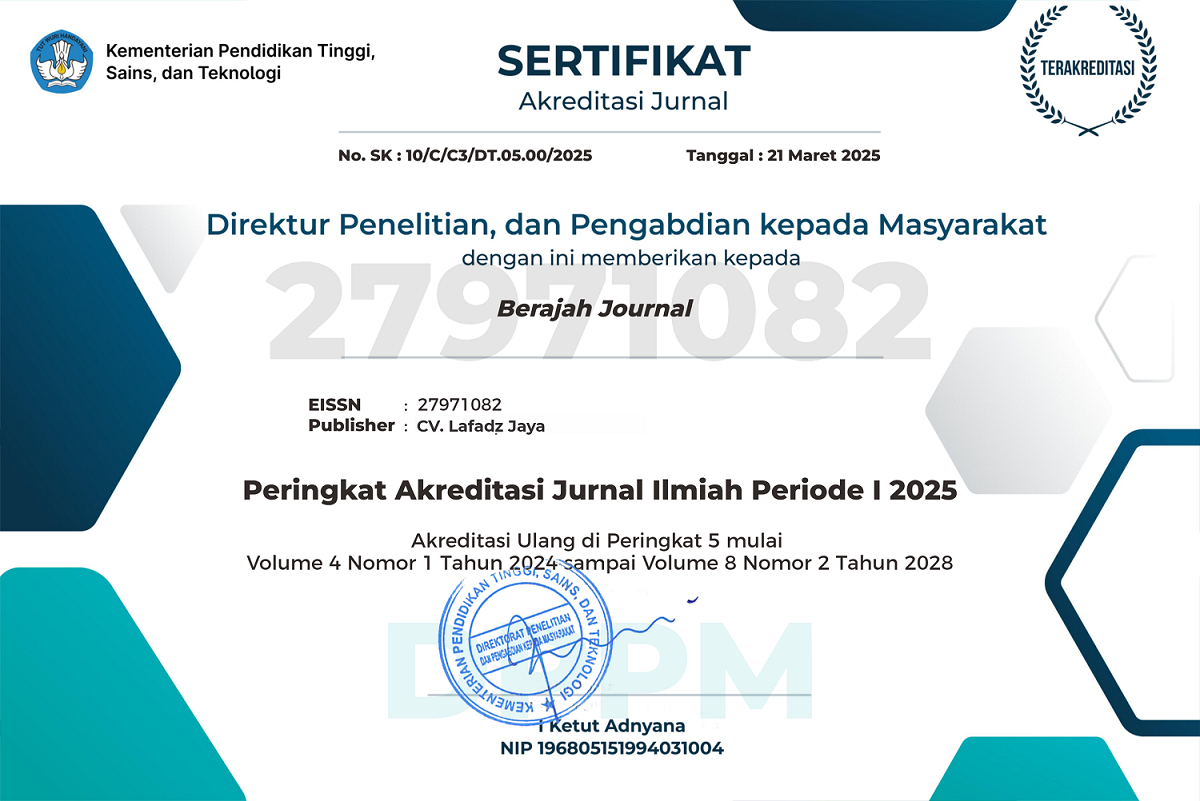CORPORATE ZAKAT IMPLEMENTATION: CHALLENGES AND OPPORTUNITIES IN MODERN ECONOMY
DOI:
https://doi.org/10.47353/bj.v4i5.423Keywords:
corporate zakat, islamic finance, social welfare, corporate social responsibility, economic justiceAbstract
Corporate zakat is an emerging concept in the modern economic system, where Islamic financial principles are applied to ensure wealth redistribution and social justice. While zakat is traditionally known as a personal obligation, corporate zakat extends this duty to business entities, particularly in Muslim-majority countries. This article explores the implementation of corporate zakat, focusing on the challenges and opportunities it presents in the modern economic context. Corporate zakat has the potential to significantly impact social welfare by channeling funds to the less fortunate, while simultaneously enhancing corporate social responsibility (CSR) frameworks. However, its implementation faces several challenges, including low corporate awareness, lack of clear regulations, and inconsistent calculation methods. This paper reviews existing literature on corporate zakat, providing a comprehensive analysis of its role in fostering economic justice and social equality. Furthermore, the article examines potential strategies for overcoming challenges, including governmental regulation, corporate governance models, and collaboration with zakat institutions. The opportunities for corporate zakat, particularly in addressing poverty and inequality, demonstrate its relevance in today’s economic landscape, especially as businesses aim for more sustainable and ethical practices.
Downloads
References
Ahmad, K. (2015). Islamic Economics and Finance: Principles and Practices. Islamic Book Publishers.
Al-Qaradawi, Y. (1999). Fiqh al-Zakat: A Comparative Study. Dar Al-Taqwa.
Chapra, M. U. (1985). Towards a Just Monetary System: A Discussion of Money, Banking, and Monetary Policy in the Light of Islamic Teachings. Islamic Foundation.
Hamat, M. N. (2014). "Corporate Zakat: The Role of Islamic Banks in Poverty Alleviation." Journal of Islamic Finance, 6(3), 22-35.
Johari, F., et al. (2018). "Corporate Zakat and CSR: Case Study in Malaysia." Journal of Business Ethics, 151(3), 651-663.
Kahf, M. (2000). Economics of Zakat. Islamic Research and Training Institute.
Manan, M. A., & Basri, H. (2015). "The Role of Zakat in Reducing Poverty: A Case Study of Bangladesh." International Journal of Zakat and Islamic Philanthropy, 2(2), 45-59.
Qaradawi, Y. (2011). The Law of Zakat. Dar Al-Taqwa.
Usmani, M. T. (2012). An Introduction to Islamic Finance. Kluwer Law International.
Obaidullah, M. (2008). Role of Zakat in Poverty Alleviation: A Case Study of India. Islamic Research and Training Institute.
Sulaiman, M., & Zakari, M. (2015). "Zakat and Poverty Alleviation: A Case Study of Pakistan." International Journal of Social Welfare, 24(4), 325-340.
Laldin, M. A., & Furqani, H. (2013). "The Objectives of Islamic Finance: Towards Socio-Economic Development." International Journal of Islamic Finance, 4(1), 11-22.
Hassan, A., & Noor, M. A. (2016). Zakat in Malaysia: Governance and Impact on Social Welfare. Islamic Finance Journal.
Lewis, M. K. (2001). "Islam and Accounting." Accounting Forum, 25(2), 103-127.
Azman, N., et al. (2014). "Corporate Zakat: A New Dimension of CSR in Malaysia." Malaysian Accounting Review, 13(2), 45-62.
Monzer, K. (1998). Zakat: Performance and the Role of the State. Islamic Research and Training Institute.
Iqbal, Z., & Mirakhor, A. (2011). An Introduction to Islamic Finance: Theory and Practice. John Wiley & Sons.
Bakar, M. D. (2017). "Zakat as a Mechanism for Wealth Distribution: A Study of Corporate Zakat in Islamic Finance." Arab Law Quarterly, 31(1), 125-140.
Rahman, A. (2007). Islamic Finance and Economic Development: Towards a Balanced Approach. Harvard Islamic Finance Forum.
Musa, H., & Abdullah, N. (2013). "Zakat as a Corporate Social Responsibility Strategy." Middle-East Journal of Scientific Research, 15(3), 434-441.
Ali, S. S., & Odeduntan, S. (2015). Zakat and Sustainable Development: Theory, Practice, and Challenges. Cambridge Islamic Finance.
Ahmed, H., & El-Gamal, M. (2015). Islamic Finance: Law, Economics, and Practice. Cambridge University Press.
Nurul, H. A. (2019). "The Role of Corporate Zakat in Alleviating Poverty: Evidence from Islamic Banks in Malaysia." Journal of Islamic Finance, 9(1), 77-88.
Bashir, A. H., & Amin, R. (2018). Economic Implications of Zakat in Modern Economies. Islamic Finance Review.
Hasan, Z. (2016). "Corporate Zakat and CSR: Islamic Finance and Business Ethics in Malaysia." Journal of Financial Regulation and Compliance, 24(2), 134-149.
Abdullah, M. N., et al. (2018). "The Role of Zakat Institutions in Economic Development: A Case Study of Malaysia." Journal of Islamic Finance and Development, 5(1), 88-101.
Asyraf, W., & Shafiai, M. (2016). "Corporate Zakat as a Strategy for Social Welfare: Evidence from Southeast Asia." Asian Social Science Journal, 12(7), 187-194.
Zaman, H. (2017). Zakat Management and Governance: Principles and Practice. Oxford Islamic Finance Review.
Siddiqi, M. N. (2004). "Islamic Economics and Finance: Where Do They Stand?" Islamic Economic Studies, 11(2), 1-48.
Haq, M. (2018). Zakat, Poverty, and Economic Stability: Insights from Islamic Finance. Islamic Development Bank.
Downloads
Published
How to Cite
Issue
Section
License
Copyright (c) 2024 Ziyana Walidah

This work is licensed under a Creative Commons Attribution 4.0 International License.






















